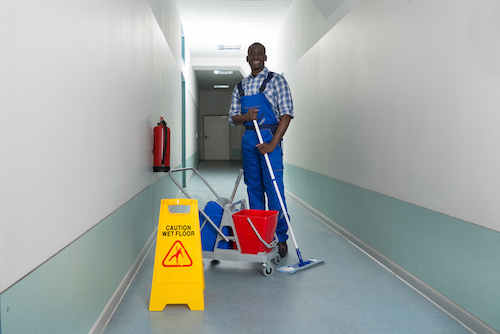
Starting a cleaning company is a great business opportunity, but starting from scratch can be overwhelming. CleanTelligent’s six-step guide to starting your own cleaning business can get you on the right track.
The cleaning industry has been steadily growing since 2015. Though there was a slight dip in the industry in 2020 due to the worldwide COVID-19 pandemic, the professional cleaning services market is projected to grow at a CAGR of 6%+ over the next five years. All that means is that now is a great time to put your gloves on, grab your broom and get started.
Why a Cleaning Business?
With so many business opportunities available, why should you start a cleaning business? Compared to other businesses, starting a cleaning business requires minimal overhead or operating costs, and cleaning/sanitation is an industry with reliable demand. Overall cleanliness and sanitation have become an even bigger priority in 2021 that you can cash in on.
When you open a start-up cleaning business you get:

- Relatively low upfront costs
- Low overhead and operating costs
- Reliable demand
- No formal training or certificates required
- No special equipment is necessary
If you have been looking to start a business, cleaning is a great industry to jump into. You can start small and prepare to grow or go straight to a large operation.
What do you need to start a cleaning service business?
The investment costs associated with starting a cleaning business are not high, but low initial costs do not automatically equate to success. Here are some questions to ask yourself before taking the plunge and making the investment of your time and your money.
What kind of cleaning business do you want to start?
Are you going to do a commercial cleaning business or a home cleaning business? With that answer in mind, are you looking to hire multiple people and manage them or participate in most of the cleaning yourself? It’s good to give yourself some room to grow. The answers to these questions might change after a few years in business, but consider where you want to start as well as how you want to change.
And if you are looking to start or join a franchise? We can help.
What is the competition like?
Once you have an idea about what area your business will exist in, check out the competition. What do they charge? What makes them successful or not? How are they marketing? In studying your competition, you can figure out what gaps your service can fill.
If you can’t engage in formal market research, you can still observe what existing cleaning companies are doing. Seek answers to questions like, where do they concentrate their marketing efforts and what services are they providing? Market research will help you identify what cleaning companies in your area are doing to be successful. You can use your research to inform your other decisions and to determine your competitive advantage.
Steps to Set Up a Cleaning Business
1. Write Your Cleaning Services Business Plan

Your business plan will serve as the roadmap for structuring, running and growing your new business. A business plan should include:
- Mission
- Pricing Strategy
- Marketing and advertising strategy
- Key financial information
2. Fund Your Business

Every business needs funding. One of the great things about starting a cleaning company is the relatively low startup costs. To determine exactly how much money you will need, identify what initial costs, as well as on-going expenses like payroll, purchasing cleaning products, travel expenses, and web-hosting.
The U.S. Small Business Administration estimates that most microbusinesses cost between $2000-$5000 to start. If you are looking to join a franchise or start off with a larger organization, you should expect costs to be higher.
There are several options for funding your small business. You can self-fund, or get a loan from a friend or family member. If neither of those work for you, you can always apply for a small business loan, though you will need good credit to qualify.
3. Choose a Business Structure
The business structure you choose affects how much you pay in taxes, the paperwork you need to file, your ability to raise money, and your personal liability. The two most common business structures are
- Sole proprietorship. In this business structure you are working by yourself and under your own name.
- Limited Liability Corporation (LLC). A small business that protects personal assets from company liabilities.
4. Name Your Cleaning Business
The name you choose for your business can be serious and simple, or fun and clever. It’s entirely up to you! You should pick a name that clearly conveys what you do and is easy to spell and say.
If you are stuck on a name, try including words related to the industry, your specialty or your location.
5. Make It Official

Once you have made it to step five, it’s time to complete the formal paperwork. The requirements for this step may vary depending on your region, so verify what you need to do with your local government.
In most cases you will need to:
- Register your business
- Get federal and state tax IDs
- Apply for licenses and permits
- Open a business bank account
If you have completed steps one through four, step five should be easier as all the big decisions have been made.
6. Marketing a Cleaning Business
When you are just starting out, your first clients will be the hardest ones to get. But, if you do it right, it will all build from there.
To jumpstart getting your first few clients try utilizing your network, cold calling local businesses and marketing online with social pages and your own website.
Once you have gotten those first clients, ask them to leave you a review. Reviews are essential for your business. Positive client reviews make your business easier for new clients to trust and can make your business easier to find online.
Making a Cleaning Business Successful

Cleaning is always in demand. No matter what size of cleaning business you have decided to start, success is a matter of understanding your customer and meeting their needs.
Demonstrating the work you have done to your clients can be challenging, but with a good company culture, a focus on customer satisfaction, and a janitorial software for quality control, you will have all the tools you need to be successful.
In any kind of business, setting goals is a key part of success. Download our eBook, Creating a 5 Year Plan for more information on goal setting in the cleaning industry.
